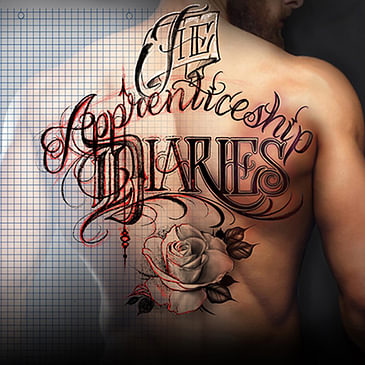I only kid because I love you man! Had to do an Aussie spin-off with the name of this first piece of Kyle Devaney's (Kyle Ghost) Diary Entry.
Kyle has been in the business for 7 years and pretty much had to frog-hop to one situation to another, in order to be the artist he is today (very talented btw!); He's landed in his own studio (Ghost Gallery Tattoo Company) and I thought this would be a great time to reflect on all that's been learned.
Thank you so much for this time Kyle. You're a Dad and now a shop owner; I know how hard free time is to come by and I'm so very grateful.
Thank you always Listeners. Your time in participating in this podcast is always a gift. Bless you!
~Sound Design by: Amy Nicholls who owes (Sound Wizard) Chuck Nunn (@djchucknunn) for Intros/Exits and for his years of audio support that was the foundation of this podcast. Bless you Chuck!
~New Intro and Exit Music by Chuck Nunn. "Jamuary 10" (list of Jamuary's found here at: Soundcloud.com/chuck-nunn )
~OG Intro and Exit Music (Current Black Box Music) done by: Brandon Carter at (Brandon Scott Carter Publishing). The name of the OG track is "Ink Apprentice". If you like Brandon's sound, you can email him at: (brandon.carter@outlook.com)
~ We are affiliates of Reinventing the Tattoo and if you would like to get off-the-wall value for continuing art education (from master tattoo artists) then follow this link to save 10% on a year subscription: TAD10
You can find us currently on:
IG: @the_apprenticeship_diaries
FB: The Apprenticeship Diaries
X : TheApprenticeshipDiaries~We were suspended from Twitter but now that it's "X" we decided to delete the past and move forward; Trusting that the information is out about what happened (so the story stays straight). Let it be known that this wasn't a confession of guilt; Rather a movement made where none was happening. Twitter was a past life... We move forward on X.
We are on these listening platforms:
iTunes or iHeartRadio
If you have a passion for muzzle loaders and black power rifles, be sure to follow Rico's creations here.
****If you liked The Apprenticeship Diaries (T.A.D.), please follow us, rate, and review us! Also, get our webpage to climb on the search engine by visiting it HERE. If you would like to donate to the show, we greatly appreciate the support. Click here to throw us a little love. <3**** All $ will be put back into the show and delivering an elevated listening experience.
We would love constructive criticism. :) 5 stars is always great, but we wanna earn it!
Another amazing way to support us would be to buy some merchandise. We have hoodies, t-shirts and more, hosted by TeePublic. You can go checkout our store by clicking here.
If you'd like to reach out to us directly, comment, advise, or offer an interview, please email at:
theapprenticeshipdiaries@gmail.com
This phrase (above) will link you to our own independent website. :)

